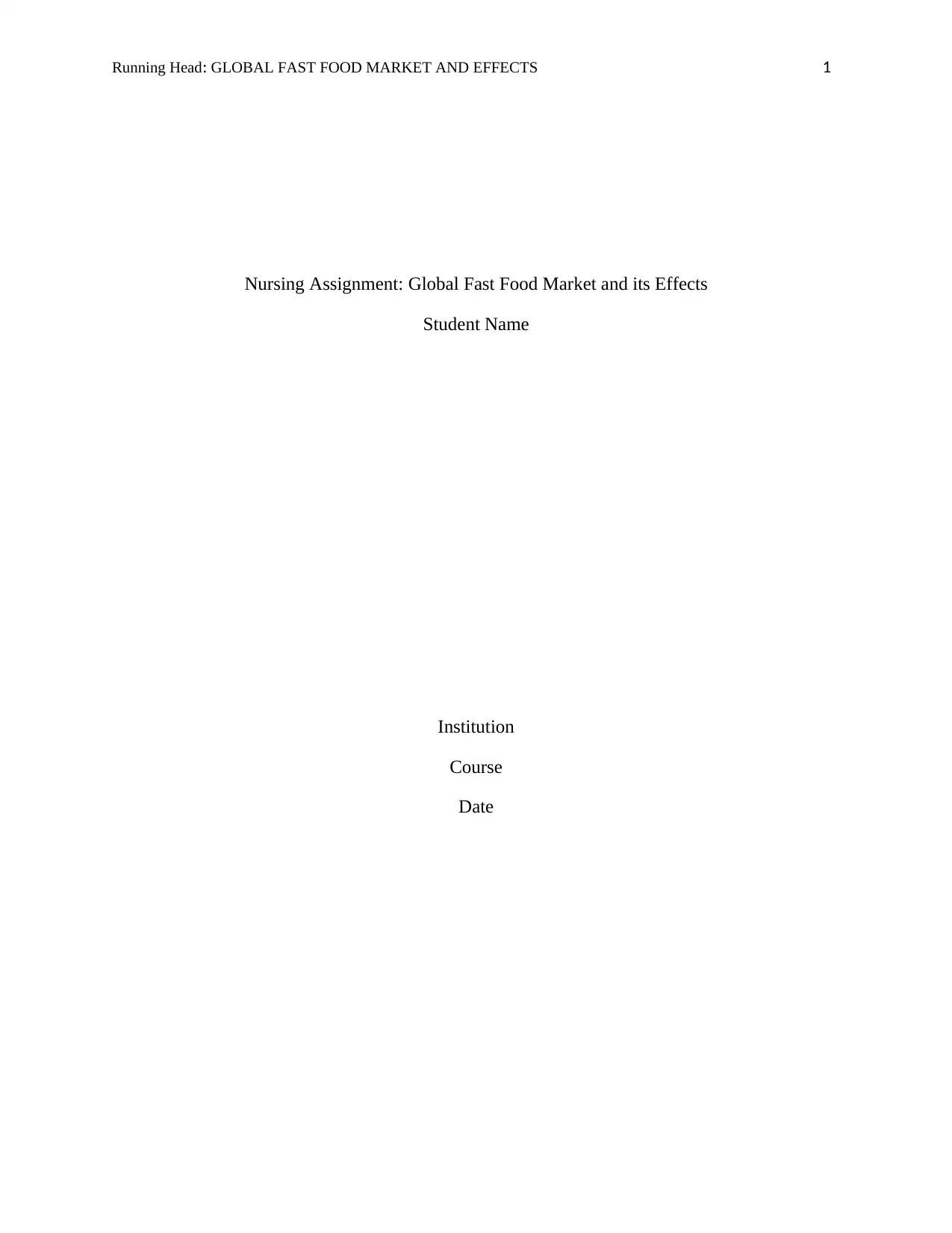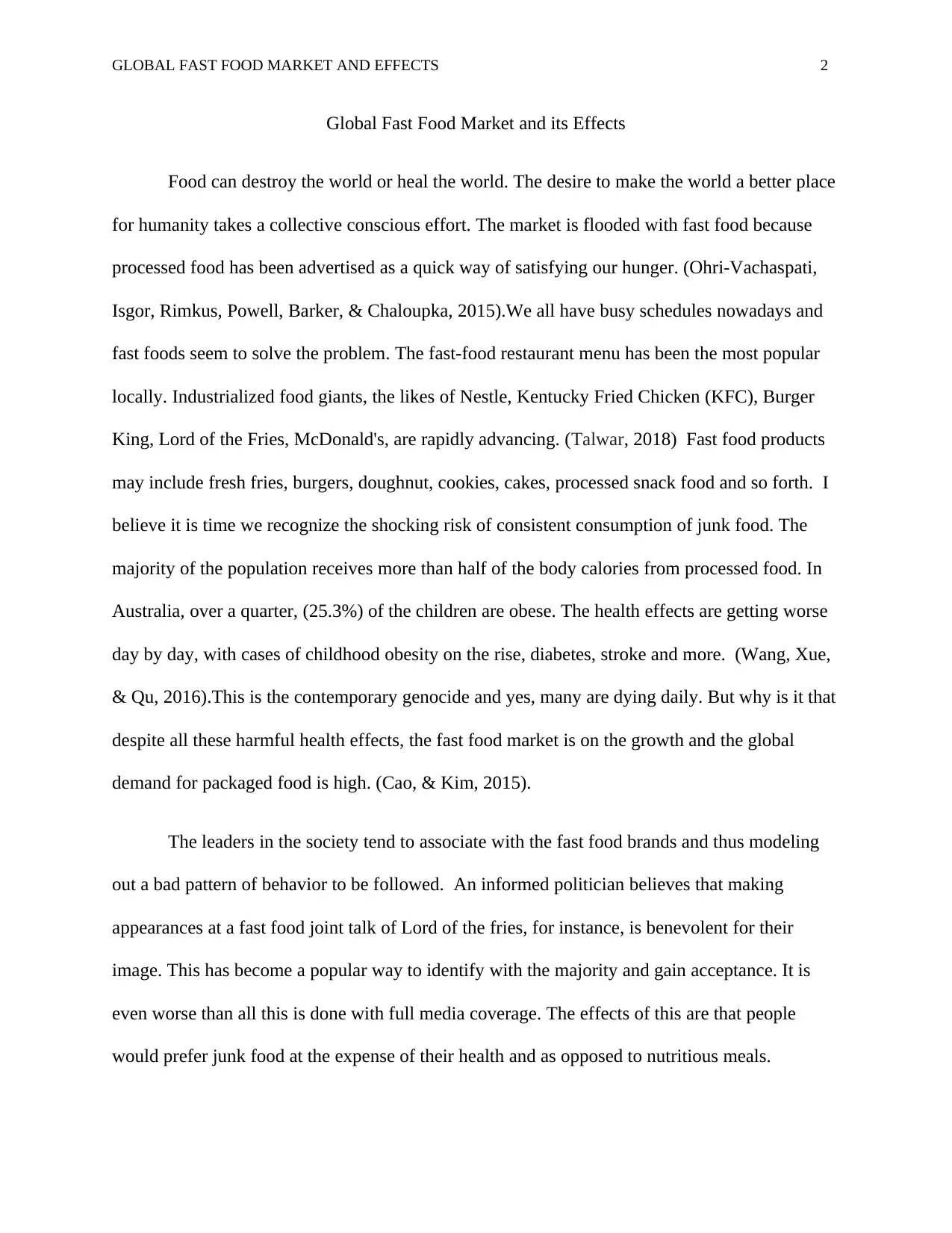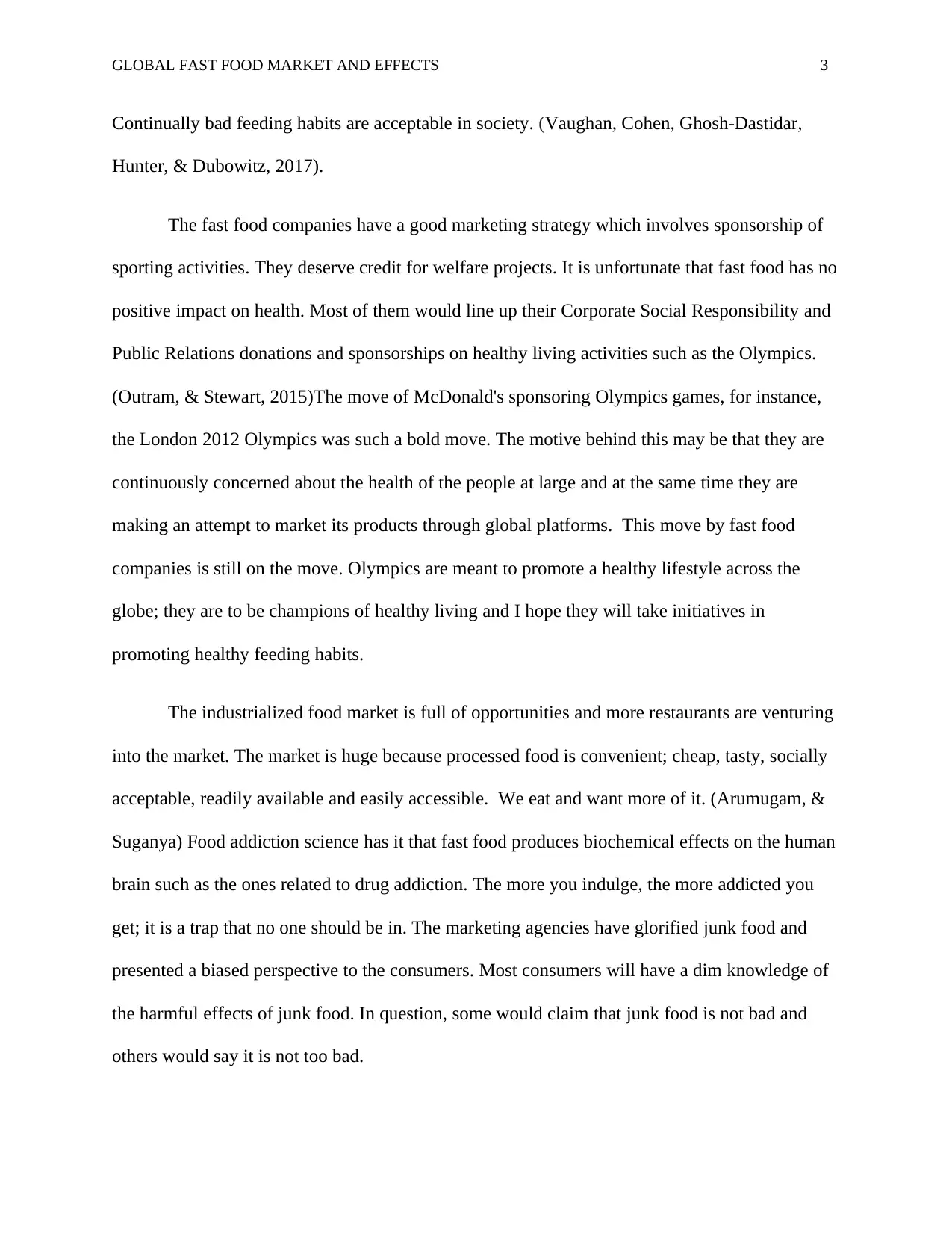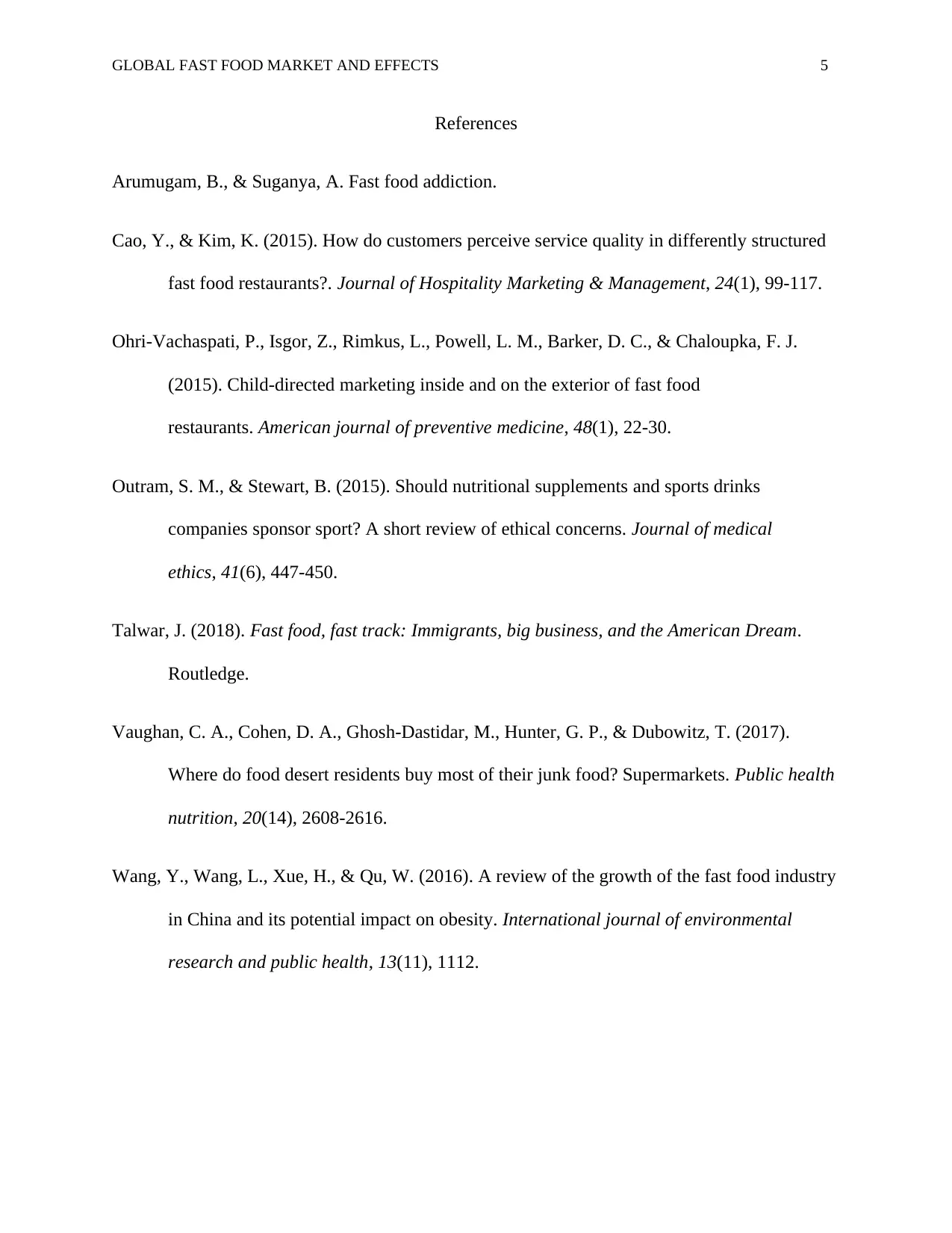Nursing Assignment: Global Fast Food Market and Its Effects
VerifiedAdded on 2023/01/23
|5
|1153
|36
Report
AI Summary
This nursing assignment report delves into the multifaceted impacts of the global fast food market. It highlights the aggressive marketing strategies employed by fast-food giants like McDonald's, KFC, and Burger King, and their influence on consumer behavior, particularly the rise of unhealthy eating habits. The report emphasizes the alarming increase in obesity, diabetes, and other health issues linked to the consumption of processed foods. It further examines the addictive nature of fast food and the role of societal leaders and media in normalizing and promoting junk food consumption. The assignment underscores the urgent need for a collective shift towards nutritious eating habits, advocating for solidarity in rejecting fast food in favor of healthier alternatives, and promoting public health awareness. The report references key studies on the subject, providing a comprehensive overview of the global fast-food market's detrimental effects on individual and public health.

Running Head: GLOBAL FAST FOOD MARKET AND EFFECTS 1
Nursing Assignment: Global Fast Food Market and its Effects
Student Name
Institution
Course
Date
Nursing Assignment: Global Fast Food Market and its Effects
Student Name
Institution
Course
Date
Paraphrase This Document
Need a fresh take? Get an instant paraphrase of this document with our AI Paraphraser

GLOBAL FAST FOOD MARKET AND EFFECTS 2
Global Fast Food Market and its Effects
Food can destroy the world or heal the world. The desire to make the world a better place
for humanity takes a collective conscious effort. The market is flooded with fast food because
processed food has been advertised as a quick way of satisfying our hunger. (Ohri-Vachaspati,
Isgor, Rimkus, Powell, Barker, & Chaloupka, 2015).We all have busy schedules nowadays and
fast foods seem to solve the problem. The fast-food restaurant menu has been the most popular
locally. Industrialized food giants, the likes of Nestle, Kentucky Fried Chicken (KFC), Burger
King, Lord of the Fries, McDonald's, are rapidly advancing. (Talwar, 2018) Fast food products
may include fresh fries, burgers, doughnut, cookies, cakes, processed snack food and so forth. I
believe it is time we recognize the shocking risk of consistent consumption of junk food. The
majority of the population receives more than half of the body calories from processed food. In
Australia, over a quarter, (25.3%) of the children are obese. The health effects are getting worse
day by day, with cases of childhood obesity on the rise, diabetes, stroke and more. (Wang, Xue,
& Qu, 2016).This is the contemporary genocide and yes, many are dying daily. But why is it that
despite all these harmful health effects, the fast food market is on the growth and the global
demand for packaged food is high. (Cao, & Kim, 2015).
The leaders in the society tend to associate with the fast food brands and thus modeling
out a bad pattern of behavior to be followed. An informed politician believes that making
appearances at a fast food joint talk of Lord of the fries, for instance, is benevolent for their
image. This has become a popular way to identify with the majority and gain acceptance. It is
even worse than all this is done with full media coverage. The effects of this are that people
would prefer junk food at the expense of their health and as opposed to nutritious meals.
Global Fast Food Market and its Effects
Food can destroy the world or heal the world. The desire to make the world a better place
for humanity takes a collective conscious effort. The market is flooded with fast food because
processed food has been advertised as a quick way of satisfying our hunger. (Ohri-Vachaspati,
Isgor, Rimkus, Powell, Barker, & Chaloupka, 2015).We all have busy schedules nowadays and
fast foods seem to solve the problem. The fast-food restaurant menu has been the most popular
locally. Industrialized food giants, the likes of Nestle, Kentucky Fried Chicken (KFC), Burger
King, Lord of the Fries, McDonald's, are rapidly advancing. (Talwar, 2018) Fast food products
may include fresh fries, burgers, doughnut, cookies, cakes, processed snack food and so forth. I
believe it is time we recognize the shocking risk of consistent consumption of junk food. The
majority of the population receives more than half of the body calories from processed food. In
Australia, over a quarter, (25.3%) of the children are obese. The health effects are getting worse
day by day, with cases of childhood obesity on the rise, diabetes, stroke and more. (Wang, Xue,
& Qu, 2016).This is the contemporary genocide and yes, many are dying daily. But why is it that
despite all these harmful health effects, the fast food market is on the growth and the global
demand for packaged food is high. (Cao, & Kim, 2015).
The leaders in the society tend to associate with the fast food brands and thus modeling
out a bad pattern of behavior to be followed. An informed politician believes that making
appearances at a fast food joint talk of Lord of the fries, for instance, is benevolent for their
image. This has become a popular way to identify with the majority and gain acceptance. It is
even worse than all this is done with full media coverage. The effects of this are that people
would prefer junk food at the expense of their health and as opposed to nutritious meals.

GLOBAL FAST FOOD MARKET AND EFFECTS 3
Continually bad feeding habits are acceptable in society. (Vaughan, Cohen, Ghosh-Dastidar,
Hunter, & Dubowitz, 2017).
The fast food companies have a good marketing strategy which involves sponsorship of
sporting activities. They deserve credit for welfare projects. It is unfortunate that fast food has no
positive impact on health. Most of them would line up their Corporate Social Responsibility and
Public Relations donations and sponsorships on healthy living activities such as the Olympics.
(Outram, & Stewart, 2015)The move of McDonald's sponsoring Olympics games, for instance,
the London 2012 Olympics was such a bold move. The motive behind this may be that they are
continuously concerned about the health of the people at large and at the same time they are
making an attempt to market its products through global platforms. This move by fast food
companies is still on the move. Olympics are meant to promote a healthy lifestyle across the
globe; they are to be champions of healthy living and I hope they will take initiatives in
promoting healthy feeding habits.
The industrialized food market is full of opportunities and more restaurants are venturing
into the market. The market is huge because processed food is convenient; cheap, tasty, socially
acceptable, readily available and easily accessible. We eat and want more of it. (Arumugam, &
Suganya) Food addiction science has it that fast food produces biochemical effects on the human
brain such as the ones related to drug addiction. The more you indulge, the more addicted you
get; it is a trap that no one should be in. The marketing agencies have glorified junk food and
presented a biased perspective to the consumers. Most consumers will have a dim knowledge of
the harmful effects of junk food. In question, some would claim that junk food is not bad and
others would say it is not too bad.
Continually bad feeding habits are acceptable in society. (Vaughan, Cohen, Ghosh-Dastidar,
Hunter, & Dubowitz, 2017).
The fast food companies have a good marketing strategy which involves sponsorship of
sporting activities. They deserve credit for welfare projects. It is unfortunate that fast food has no
positive impact on health. Most of them would line up their Corporate Social Responsibility and
Public Relations donations and sponsorships on healthy living activities such as the Olympics.
(Outram, & Stewart, 2015)The move of McDonald's sponsoring Olympics games, for instance,
the London 2012 Olympics was such a bold move. The motive behind this may be that they are
continuously concerned about the health of the people at large and at the same time they are
making an attempt to market its products through global platforms. This move by fast food
companies is still on the move. Olympics are meant to promote a healthy lifestyle across the
globe; they are to be champions of healthy living and I hope they will take initiatives in
promoting healthy feeding habits.
The industrialized food market is full of opportunities and more restaurants are venturing
into the market. The market is huge because processed food is convenient; cheap, tasty, socially
acceptable, readily available and easily accessible. We eat and want more of it. (Arumugam, &
Suganya) Food addiction science has it that fast food produces biochemical effects on the human
brain such as the ones related to drug addiction. The more you indulge, the more addicted you
get; it is a trap that no one should be in. The marketing agencies have glorified junk food and
presented a biased perspective to the consumers. Most consumers will have a dim knowledge of
the harmful effects of junk food. In question, some would claim that junk food is not bad and
others would say it is not too bad.
⊘ This is a preview!⊘
Do you want full access?
Subscribe today to unlock all pages.

Trusted by 1+ million students worldwide

GLOBAL FAST FOOD MARKET AND EFFECTS 4
Let us all unite as one in disapproval of fast food and in acknowledgment of the nutritious
healthy food. It is true that solidarity is strength and united we can change this culture. We can
all reap the benefits of a healthy diet. We have enough healthy food both in Australia and
globally for all of us.
Let us all unite as one in disapproval of fast food and in acknowledgment of the nutritious
healthy food. It is true that solidarity is strength and united we can change this culture. We can
all reap the benefits of a healthy diet. We have enough healthy food both in Australia and
globally for all of us.
Paraphrase This Document
Need a fresh take? Get an instant paraphrase of this document with our AI Paraphraser

GLOBAL FAST FOOD MARKET AND EFFECTS 5
References
Arumugam, B., & Suganya, A. Fast food addiction.
Cao, Y., & Kim, K. (2015). How do customers perceive service quality in differently structured
fast food restaurants?. Journal of Hospitality Marketing & Management, 24(1), 99-117.
Ohri-Vachaspati, P., Isgor, Z., Rimkus, L., Powell, L. M., Barker, D. C., & Chaloupka, F. J.
(2015). Child-directed marketing inside and on the exterior of fast food
restaurants. American journal of preventive medicine, 48(1), 22-30.
Outram, S. M., & Stewart, B. (2015). Should nutritional supplements and sports drinks
companies sponsor sport? A short review of ethical concerns. Journal of medical
ethics, 41(6), 447-450.
Talwar, J. (2018). Fast food, fast track: Immigrants, big business, and the American Dream.
Routledge.
Vaughan, C. A., Cohen, D. A., Ghosh-Dastidar, M., Hunter, G. P., & Dubowitz, T. (2017).
Where do food desert residents buy most of their junk food? Supermarkets. Public health
nutrition, 20(14), 2608-2616.
Wang, Y., Wang, L., Xue, H., & Qu, W. (2016). A review of the growth of the fast food industry
in China and its potential impact on obesity. International journal of environmental
research and public health, 13(11), 1112.
References
Arumugam, B., & Suganya, A. Fast food addiction.
Cao, Y., & Kim, K. (2015). How do customers perceive service quality in differently structured
fast food restaurants?. Journal of Hospitality Marketing & Management, 24(1), 99-117.
Ohri-Vachaspati, P., Isgor, Z., Rimkus, L., Powell, L. M., Barker, D. C., & Chaloupka, F. J.
(2015). Child-directed marketing inside and on the exterior of fast food
restaurants. American journal of preventive medicine, 48(1), 22-30.
Outram, S. M., & Stewart, B. (2015). Should nutritional supplements and sports drinks
companies sponsor sport? A short review of ethical concerns. Journal of medical
ethics, 41(6), 447-450.
Talwar, J. (2018). Fast food, fast track: Immigrants, big business, and the American Dream.
Routledge.
Vaughan, C. A., Cohen, D. A., Ghosh-Dastidar, M., Hunter, G. P., & Dubowitz, T. (2017).
Where do food desert residents buy most of their junk food? Supermarkets. Public health
nutrition, 20(14), 2608-2616.
Wang, Y., Wang, L., Xue, H., & Qu, W. (2016). A review of the growth of the fast food industry
in China and its potential impact on obesity. International journal of environmental
research and public health, 13(11), 1112.
1 out of 5
Related Documents
Your All-in-One AI-Powered Toolkit for Academic Success.
+13062052269
info@desklib.com
Available 24*7 on WhatsApp / Email
![[object Object]](/_next/static/media/star-bottom.7253800d.svg)
Unlock your academic potential
Copyright © 2020–2026 A2Z Services. All Rights Reserved. Developed and managed by ZUCOL.





